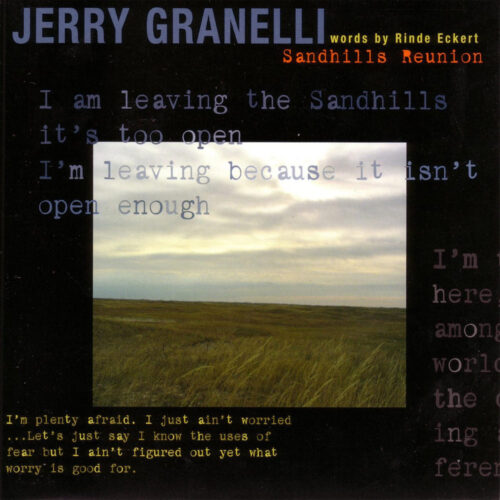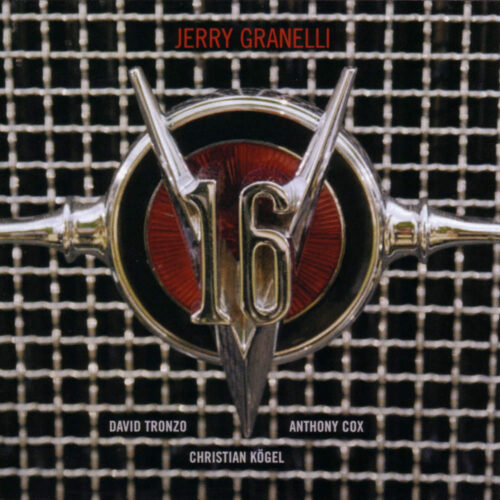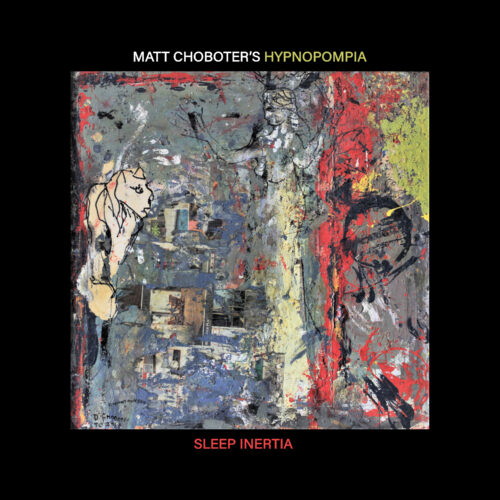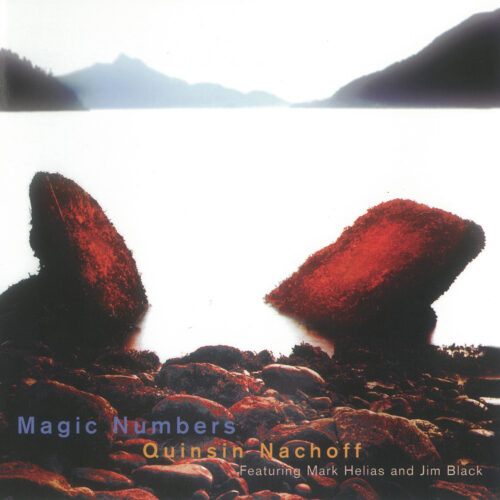Sandhills Reunion is an audio play, “a coming together of the spoken word and music.” Members of Jerry Granelli’s V16, joined by cello and woodwinds including clarinetist François Houle, perform in counterpoint to Rinde Eckert’s poetic narratives, partly inspired by the 19th-century outlaw Billy the Kid. Vivid sonics place the listener in a mythical American landscape, where echoes of the Old West resonate with contemporary traumas and realities.
– Mark Werlin, AllAboutJazz and NativeDSD reviewer
Jazz and the spoken word have been linked at least since the Beats. Jerry Granelli was an aspiring teenage drummer in San Francisco in the late 1950s, when Ginsberg, Ferlinghetti, Rexroth and Patchen declaimed to the accompaniment of local players in clubs like the Cellar and the Blackhawk, and he got to improvise a bit with most of them. In the late 70s at the Naropa Institute in Boulder, where he founded the music department, Granelli often collaborated with Ginsberg, Burroughs and Anne Waldman in improvised concerts. His fascination with words led to the 1993 Jazz Instrumental album A Song I Thought I Heard Buddy Sing, inspired by Michael Ondaatje’s experimental novel about Buddy Bolden, Coming Through Slaughter.
Sandhills Reunion is a multi-layered interweaving of words and music that Granelli called an audio movie or play. The text, written and performed by actor/playwright/singer Rinde Eckert, is a glancingly linked sequence of reflections, imaginings, internal monologues and one historically accurate dialogue (“Twenty Questions for an Outlaw”) using the persona of Billy the Kid as a thematic touchstone and the Sandhills region of northwestern Nebraska as the landscape of memory and desire. By turns rowdy, comic, ironic, nostalgic, angry and melancholy, it presents the unnamed speaker’s inner life in the context of American reality and myth (complete text included in the booklet). The music, composed and played by an ensemble of trusted Granelli collaborators, counterpoints and boldly colours the words with its timbres and rhythms. It conjures up its own “locations” within the band’s collectively imagined synthesis of blues, jazz, rock, funk, ambient, folk, country, the popular and the more esoteric music of the 20th century – from raunchy bars to uptown refinement, chamber music to the avant-garde.
Granelli explained the process of creation: “[Producer Lee Townsend and I] discussed the overall concept, basically recording it like shooting a film — just gathering material, then putting it all together in the mix. I asked the members of the band to write — not specifying what to write, but implying what I was hearing. I didn’t write a lot of music myself but was kind of the vision holder, maybe the director. The next step was finding the text, the voice. I’ve had a long relationship with Rinde. I’d originally planned to use Michael Ondaatje excerpts, but in the end Lee suggested that Rinde could create a new text. The musicians never heard any texts. Part of the reason for this is that I wanted the music to stand alone, not as a servant to the words. The idea was that we would have two strong elements that come together to produce a third thing, a new form. So the listener might pay attention one time to the music and next time to the text, and once to the feeling of both”
Jerry Granelli, drums, samples
Rinde Eckert, voice, text
François Houle, clarinet
Jeff Reilly, bass clarinet
David Mott, baritone sax
Christoph Both, cello
Christian Kögel, electric & acoustic guitars
J. Anthony Granelli, bass, lap steel guitar
Tracklist
Please note that the below previews are loaded as 44.1 kHz / 16 bit.Total time: 00:48:10
Additional information
| Label | |
|---|---|
| SKU | SGLSA15532 |
| Qualities | DSD 512 fs, DSD 256 fs, DSD 128 fs, DSD 64 fs, DXD 24 Bit, FLAC 192 kHz, FLAC 96 kHz |
| Channels | 5 Channel Surround Sound, 2ch Stereo, 2ch Stereo & 5ch Surround |
| Artists | |
| Composers | Both; Eckert, Eckert; Kögel, Granelli, Granelli; Eckert, Granelli; Kögel; Granelli; Eckert, Houle; Eckert, Kögel; Eckert, Mott; Eckert, Reilly; Eckert |
| Genres | |
| Original Recording Format | |
| Instruments | Acoustic Guitar, Baritone Saxophone, Bass, Bassclarinet, Clarinet, Electric guitar, Cello, Drums, Vocals |
| Release Date | January 16, 2025 |
Press reviews
One Final Note
“The really interesting thing about this album is that it’s a sort of Nebraska version of Beat poetry….Rinde Eckert really steals the show….His stories are some of the most vivid and amazing tales put to record recently.”
Halifax Chronicle Herald
“Driven by Granelli’s melodic, talking, singing, orchestrating drums and his vivid penetration into the music that can be found in any sound, shape, texture or colour, they improvised like gods.”
All About Jazz
“Much as films like Koyanisqaatsi have created new ways of experiencing music and the visual medium, Sandhills Reunion aims to find a new confluence of music and the spoken word. Eckert’s musings take the form of personal experience (“Our Particular Tragedy”), reflection (“Your Voice”), intriguing narrative (“Nolan”), and even a Q&A with Billy the Kid on the day of his hanging (“Twenty Questions for an Outlaw”). At times allegorical and enigmatic, at other times crystal clear, Eckert’s writing is captivating, loosely tied together through the Sandhills of Nebraska and the character of Billy the Kid. Granelli solicits music from each member of the septet, and the result is a diversity of styles that includes the ambient/new music sensibility of “River of Glass,” the Middle Eastern inflections of “Our Particular Tragedy,” the light funk of “Your Voice,” the raunchy blues of “Just Angels,” the Americana of “Last Light,” and the unabashed folk of “Spun Like a Spur.” If this were an album of strictly instrumental music, as well-conceived and executed as it is, it might appear to lack focus and direction. But when combined with Eckert’s poetry, the result is a unified work that takes the listener on a vivid journey down a number of paths that, in the end, ultimately seem to converge at the same place.”
All About Jazz
“Sandhills Reunion evokes the American experience in the prairie heartland, placing poetic viginettes of small experience under a powerful microscope on a set of of jazz-backed prose poems that explore Billy the Kid, a bygone strip joint, a kiss blown at a wedding from the violinist to a small boy in a “Little White Suit,” and roughneck workers constructing a bridge over a “River of Glass,” dangling “like a grey spider” on the end of a taunt rope to inspect the rivets and bolts. The music, composed variously by members of the band, swells with swirling reeds—clarinet, bass clarinet, baritone sax, cello/bass/guitar, and Granelli’s drums. It blows moody and cool around Eckert’s words like a prairie fog; or chugs into a reedy bump and grind on “Just Angels,” a tale that takes us into a bygone “Godforsaken den of inequity.”
Sandhills Reunion is unlike anything I’ve heard, but the mood it draws is the same as that of Bob Dylan’s John Wesley Harding or the Band’s The Band: odd, folksy, sometimes surreal tales, very American in nature, told with a simple eloquence entwined with superb yet understated musicianship. An odd, poignant masterpiece.”
The Guardian
“The album features the words and spoken voice of Rinde Eckert against a richly textured ensemble including clarinets (François Houle and Sanctuary’s Jeff Reilly) and cello….Sandhills Reunion has a contemporary sound, with echoes of Dana Bryant, and Mike Ladd and Vijay Iyer’s In What Language. Eckert acts out his texts with a North-American nonchalance that conjures up open prairies and claustrophobic, trigger-happy cowboy bars. There’s something about a certain electric guitar sound that says ‘Wild West’, and Christian Kôgel does all the right Cooderish, Frisellian things in a nicely judged soundscape produced by Lee Townsend….The tension never slips. Listen to Like a Ghost in the Grass, or 20 Questions for an Outlaw, or Last Light, which all deal with the story of William Bonney, aka Billy the Kid, from different perspectives. Eckert’s words are thoughtful and multilayered. On Your Voice he lets rip with similes that Beefheart might appreciate: ‘Your voice is like a spade shoved into packed sand/ Like decals torn from a foot locker/ Your voice smoulders like Bibles in a burned church.’ ”
Only logged in customers who have purchased this product may leave a review.









Reviews
There are no reviews yet.